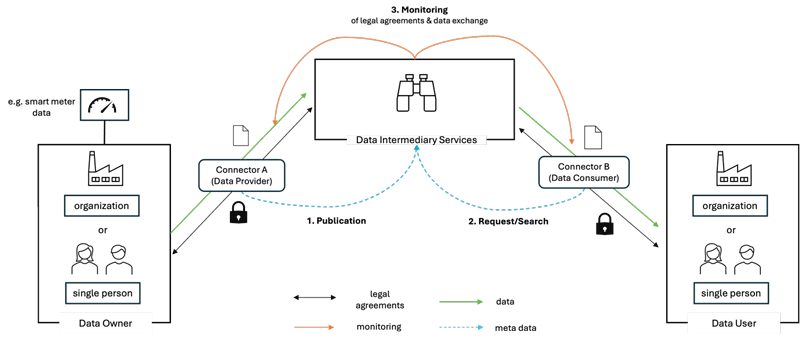by Christoph Klikovits (Forschung Burgenland GmbH) and Silke Palkovits-Rauter (Fachhochschule Burgenland)
A data intermediary plays a crucial role by ensuring compliance with data exchange rules, facilitating a fair and secure flow of data between various partners. This mediation enhances transparency, resolves conflicts, and fosters trust, enabling compliant data sharing and collaboration within a data ecosystem. In the context of smart cities, this is particularly important as it ensures that the massive amounts of data generated by urban systems (including energy data such as smart meter data) are handled responsibly to support sustainable urban development and innovative public services.
The project USEFLEDS (Unleashing Sector-coupling Flexibility by means of an Energy Data Space) [L1], led by Forschung Burgenland GmbH and involving 13 other institutions, aims to unleash sector-coupling flexibility through the establishment of an energy data space. Situated in Austria and funded by the Austrian Research Promotion Agency (FFG), the project began in November 2023 and is slated to run for four years. The primary goal is to develop service-orientated solutions that close the gap between energy production and energy consumption to promote the energy transition. A key aspect of the project is the co-creation workspace, which acts as a communication channel between the various technical work packages and involved stakeholders. Future activities will concentrate on building a technical foundation to create a data ecosystem for the energy domain. The project has garnered significant interest from public authorities, underscoring its potential impact on the energy landscape. One key innovation that will drive this impact is the concept of data spaces.
Data spaces offer a platform designed for the secure, sovereign storage, management and exchange of data in accordance with the IDSA reference architecture model. They enable structured and secure handling of data and are used in various domains (energy transition, circular economy, mobility, etc.) Data spaces can enable a controlled multilateral exchange of data. The focus is on preserving the privacy and rights of data owners [1].
Several measures within the data space reference model can give data owners sovereignty over their information and allow them to determine who can access their data and under what conditions, which can strengthen both trust and compliance. Decentralised data storage can make access to sensitive data more difficult. Implemented security protocols and access controls and authentication procedures can optimise the level of security along the data value chain and restrict access to data to authorised users to minimise unauthorised access. Encryption algorithms during transmission and storage protect the integrity and confidentiality of information. Data spaces follow the principle of data protection through privacy by design by integrating data protection measures from the outset. In addition, transparency and traceability through comprehensive logging can increase user confidence and promote compliance with data protection regulations [2].
In addition to technical solutions, the introduction of federated services and standardised procedures strengthens governance aspects and enables a form of sovereign self-administration among equal partners (e.g. through smart contracts). However, this approach is viewed critically in the case of mandatory data exchange (e.g. sustainability goals).
Data intermediaries are crucial for secure and compliant data exchange, acting as neutral parties to mitigate risks and adhere to strict data protection standards. Regulatory frameworks like the Data Governance Act provide essential oversight, emphasising the importance of trust, transparency, and accountability in data transactions. The role of a data intermediary can be pivotal as a mediator by ensuring compliance with rules for data exchange. This facilitates a fair and secure flow of data between various partners, including mandatory tasks such as environmental protection [3].
Figure 1 illustrates the role of a data intermediary within a data space scenario for exchanging energy data, specifically smart meter data. The data provider publishes metadata through a data intermediary service, which is monitoring legal agreements and the data exchange itself. The data consumer, which may be an organisation or an individual, searches for or requests these data sets. Legal agreements between both parties facilitate data exchange via the data intermediary service.

Figure 1: The role of a data intermediary within a data space scenario for exchanging energy data, specifically smart meter data.
In data ecosystems, governance services establish the legal basis for interactions through clear agreements, ensuring legal certainty and data integrity. Under the supervision of a data intermediary, the legal framework governing data sharing and usage can be monitored and managed in a controlled manner. This approach can mitigate potential tampering, enhance transparency, and resolve conflicts, thereby fostering trust and efficient data sharing and collaboration within the data ecosystem. By integrating governance guidelines within the reference architecture of data spaces, users gain clarity on data usage, which can increase trust and acceptance in digital energy services.
Link:
[L1] https://usefleds.forschung-burgenland.at/
References:
[1] M. Andenmatten, “Digitale Cloud und Datensouveränität: Illusion oder Realität?,” HMD 60, pp. 1016–1033, 2023. https://doi.org/10.1365/s40702-023-01009-4
[2] H. Pettenpohl, M. Spiekermann, and J.R. Both, “International Data Spaces in a Nutshell,” in B. Otto, et al. (eds), Designing Data Spaces, Springer, 2022. https://doi.org/10.1007/978-3-030-93975-5_3
[3] C. Ducuing, R.H. Reich, “Data governance: Digital product passports as a case study,” Competition and Regulation in Network Industries, 24(1), 3–23, 2023. https://doi.org/10.1177/17835917231152799
Please contact:
Christoph Klikovits, Forschung Burgenland GmbH, Austria











